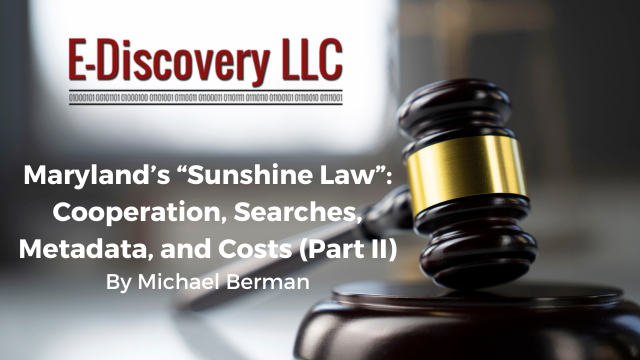
[EDRM Editor’s Note: The opinions and positions are those of Michael Berman. This is the second in a three part series, with Part I here and Part III here.]
This is Part II of a three-part blog comparing disclosure of public records under the Maryland PIA and civil discovery under the Maryland Rules.
COOPERATION IN REQUESTS FOR PUBLIC RECORDS
The duty to cooperate in civil discovery is well established. Rodriguez v. Clarke, 400 Md. 39, 60 (2007); see also J. Pike & J. Willis, “The New Maryland Deposition and Discovery Procedure,” 6 Md. L. Rev. 4, 32 (1941); M. Berman and P. Grimm, “The Duty to Cooperate in Discovery,” in M. Berman, et al., eds., “Electronically Stored Information in Maryland Courts” (Md. State Bar Ass’n. 2020); “The Sedona Conference Cooperation Proclamation,” 10 Sedona Conf. J. 331 (2009).
There is also a parallel duty under the PIA: “For the MPIA to work as the General Assembly intends, applicants and custodians must engage in collaborative efforts when the path to fulfillment of a records request presents obstacles.” Baltimore Police Dept., 2023 WL 5616318, at *4. Thus, “an agency should in good faith provide some reasonable assistance to the requestor in refining the request for the records the requestor seeks.” Id. (citation omitted).
The Supreme Court of Maryland added: “We also trust that both parties will proceed on remand in the spirit of collaboration upon which the MPIA depends for successful resolution of complicated requests for records that implicate competing interests.” Id. at *29. It wrote in footnote 36: “We expect that the parties will engage in collaborative efforts with new verve, given the importance of the public records at issue.”
In that respect, the PIA and civil discovery are similar.
PERFECT SEARCHES ARE NOT REQUIRED
It is well-established in e-discovery that perfection is not the standard; reasonableness is. See, e.g., What Does “The Making of a Surgeon” Have to Do With ESI and “Software Glitches?” (citing cases). “[T]he perfect is the enemy of the good,” P. Grimm, L. Bergstrom, and M. Kraeutter, “Federal Rule of Evidence 502: Has It Lived Up To Its Potential?,” 17 Rich.J.L. & Tech. 13, 41, quoting Voltaire.
The same is true in connection with agency searches for public records under the PIA. The PIA Manual of the Maryland Attorney General states that: “The PIA does not address the issue of the adequacy of the agency’s search for records.” The Attorney General wrote that agencies “may be required to conduct relatively broad and time-consuming searches.”
The reasonableness of an agency’s search is to be measured prospectively by how the agency designed the effort to find responsive records, not retrospectively by its success in locating every responsive record. A search may be reasonable and adequate without being perfect.
Glass v. Anne Arundel Co., 453 Md. 201, 232 (2017) (emphasis added).
However, the PIA requires only a reasonable search “designed to locate all records responsive to the particular PIA request, not a perfect search that leaves no stone unturned.” Glass v. Anne Arundel Co., 453 Md. 201, 233 (2017). “The reasonableness of an agency’s search is to be measured prospectively by how the agency designed the effort to find responsive records, not retrospectively by its success in locating every responsive record. A search may be reasonable and adequate without being perfect.” Id. at 232 (emphasis added). The Court wrote, in note 32, that an agency is not required to hire a computer expert and conduct a forensic examination to recover deleted records or search backup files, unless it both is able to, and does, access the records for its own purposes without extraordinary expense.
That reasonable, limiting principle should be applied in conjunction with the duty to cooperate. The Glass Court wrote that, “if possible, an agency should in good faith provide some reasonable assistance to the requestor in refining the request for records the requestor seeks. Of course, nothing requires the requestor to accept such assistance.” Id. at 232. The Court continued:
In practice, a productive response to a PIA request is often an iterative process in which the agency reports on the type and scope of the files it holds that may include responsive records, and the requestor refines the request to reduce the labor (and expense) of searching those records. When the requestor and agency work together, the process approximates the purpose and policy of the PIA. When they do not, what results is the requestor insisting on what, to the agency, is an unbounded and unreasonable search and the agency insisting on what, to the requestor, is an unbounded and unreasonable fee.
Glass v. Anne Arundel Co, 453 Md. at 233 (2017) (emphasis added).
While agencies generally lack litigation review platforms that can share “hit reports,” in regard to cooperating on searches, civil discovery and the PIA are mirror images.
Part III will address metadata, where there is wide gap between the PIA and civil discovery, and apportionment and waiver of costs.


